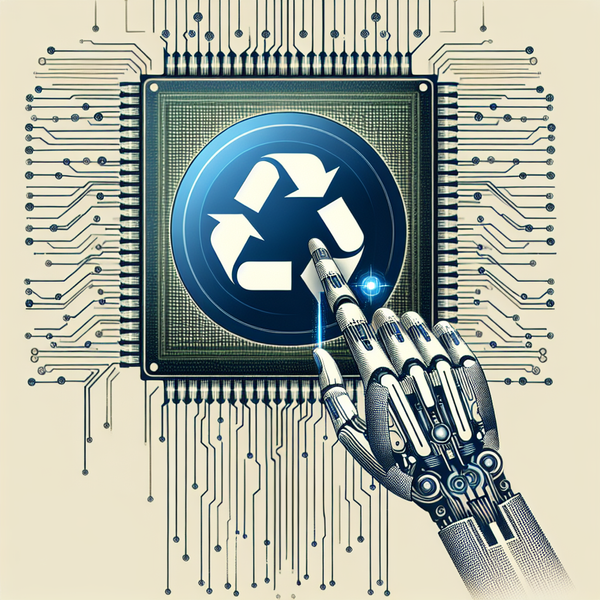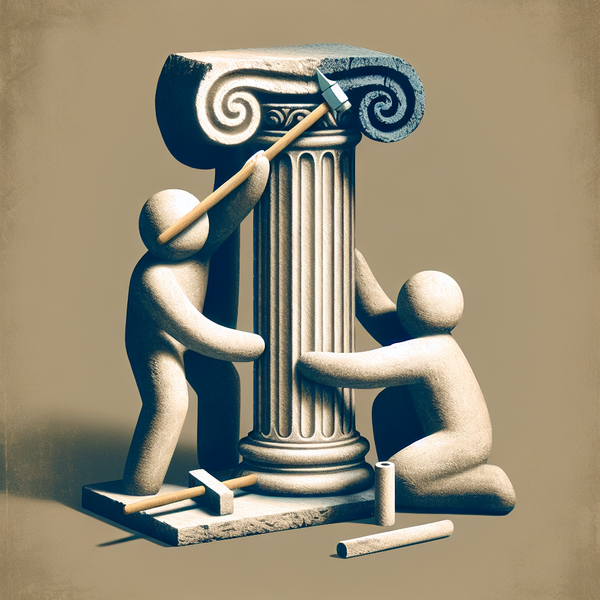Disrupting Global Finance: The Cryptocurrency and Blockchain Revolution

Cryptocurrency & Blockchain: Revolutionary Technologies Shaping the Global Economy
The Future of Money and Transactions is Digital
In the midst of geopolitical complexities and shifting economic landscapes, one thing remains constant - the world is steadily marching towards a digital future. As President Donald Trump endeavors to mend diplomatic relations with Iran, paving the way for potential economic reformations, the world is also keenly observing another revolution making waves in the financial sphere - Cryptocurrency and Blockchain technology. These groundbreaking technologies are not just buzzwords being touted by tech enthusiasts, but rather, they are the new frontier in global commerce and digital finance. As we observe the ongoing developments in global politics, such as President Trump's diplomatic efforts in Oman, it's impossible to overlook the potential impact of cryptocurrency and blockchain on global finance and economic systems. Shaping the way we perceive and conduct business, these technologies could very well be the cornerstone of the next digital revolution.
Case Study 1: The Rise of Bitcoin and Blockchain Technology
Background
Bitcoin, the first cryptocurrency, was created in 2009 by an anonymous entity known as Satoshi Nakamoto. It introduced the world to blockchain technology, a decentralized and transparent public ledger system that records all transactions.
Development and Impact
Bitcoin started as a niche interest but has grown exponentially over the years. In 2010, one bitcoin was worth less than a dollar. Fast forward to 2021, its value peaked at over $60,000. This massive growth showcased the potential of cryptocurrencies and led to the creation of over 4,000 different cryptocurrencies. Blockchain technology, on the other hand, has found use cases beyond cryptocurrencies. Industries from healthcare to supply chain management have adopted it for its transparency, security, and efficiency. For instance, IBM and Maersk have used blockchain to enhance transparency and efficiency in their global supply chain.
Conclusion
The rise of Bitcoin and blockchain technology has forever changed how we view money and transactions. It has paved the way for decentralized finance and has the potential to disrupt traditional financial systems.
Case Study 2: Ethereum and Smart Contracts
Background
Ethereum was launched in 2015, and unlike Bitcoin, it's not just a cryptocurrency but also a platform for deploying smart contracts and decentralized applications (dApps).
Development and Impact
Ethereum’s native currency, Ether, has also seen significant growth, reaching a high of over $4,000 in 2021. However, what sets Ethereum apart is its smart contract functionality. Smart contracts are self-executing contracts with the terms of the agreement directly written into code. This feature has led to the development of numerous dApps on Ethereum's network, contributing to the rise of the decentralized finance (DeFi) sector. One notable example is the creation of Uniswap, a decentralized exchange built on Ethereum’s network. It allows users to trade directly with each other without intermediaries, offering more freedom and potentially lower costs.
Conclusion
Ethereum's innovative use of blockchain technology to deploy smart contracts and dApps has made it a significant player in the crypto world. It has opened up new possibilities in DeFi and beyond.
Case Study 3: Ripple and Cross-Border Transactions
Background
Ripple was created in 2012 with a specific focus on enabling fast, low-cost international money transfers.
Development and Impact
Unlike Bitcoin and Ethereum, Ripple (XRP) was not designed to be a method of payment but rather a technology to facilitate cross-border transactions. Ripple's payment protocol, RippleNet, allows banks and other financial institutions to transfer money worldwide quickly and cheaply. Several major financial institutions have adopted or tested RippleNet, including American Express and Santander. This has not only increased the efficiency of international transfers but has also shown the potential for blockchain technology to be integrated into existing financial systems.
Conclusion
Ripple's focus on cross-border transactions has shown how blockchain technology can be tailored to solve specific problems. It has demonstrated the potential for cryptocurrencies and blockchain technology to coexist and even enhance traditional financial systems. Cryptocurrency and blockchain technology have become prevalent topics in today's digital age. Experts in the field foresee that these technologies will have significant impacts on various sectors, including politics, economy, and international relations. While it might seem unrelated, the recent development featuring President Trump's efforts to fix the Iran nuclear deal might have some relevance in the context of cryptocurrency and blockchain. Firstly, it's worth mentioning that Iran has shown significant interest in cryptocurrencies and blockchain technology. As the country faces economic sanctions and isolation from the West, the potential of these decentralized and borderless technologies offers Iran an opportunity to bypass traditional financial systems and maintain its economic stability. Experts like Peter McCormack, host of the 'What Bitcoin Did' podcast, argue that cryptocurrencies could effectively help countries like Iran mitigate the impact of economic sanctions. He suggests that the open nature of blockchain technology makes it difficult for a single entity, such as a government, to control or limit its use. This sentiment is echoed by Roger Ver, CEO of Bitcoin.com, who states that cryptocurrencies can "empower individuals to not be beholden to the whims of politicians." In the context of Trump's diplomatic overtures, one could speculate that the rise of cryptocurrency in Iran might be a factor in his decision-making. The potential for digital currencies to undermine sanctions could be viewed as a threat to traditional geopolitical power structures. As such, it's possible that the U.S. administration sees restoring the nuclear deal as a way to reengage with Iran and exert some level of influence over its economic activities. Another angle to consider is that blockchain, the technology underpinning cryptocurrencies, could provide a transparent and immutable record of transactions. This could potentially be used to track and verify Iran's adherence to any terms set out in a renewed nuclear deal. Such an application would be consistent with the views of blockchain experts like Don Tapscott, who argue that the technology could revolutionize how we trust and verify information. In conclusion, while the connection between Trump's actions regarding the Iran nuclear deal and the world of cryptocurrency and blockchain might not be explicit, there are certainly potential implications and interplays to consider. As these technologies continue to grow and evolve, their impact on global politics and economies will undoubtedly become an increasingly important topic of discussion.
1. What is Cryptocurrency?
Cryptocurrency is a digital or virtual currency that uses cryptography for security. It is primarily a decentralized form of currency, relying on blockchain technology to gain transparency and immutability. For more information, check out this Investopedia article.
2. What is Blockchain Technology?
Blockchain is a specific type of database that stores data in blocks that are chained together. As new data comes in, it is entered into a fresh block. When the block is filled with data, it is chained onto the previous block. You can learn more about it in this Investopedia guide.
3. How Does Cryptocurrency Work?
Cryptocurrencies work using a technology called blockchain. Blockchain is a decentralized technology spread across many computers that manage and record transactions. For a more detailed explanation, refer to this Forbes article.
4. Why is Blockchain Important?
Blockchain technology has a large potential to transform business operating models in the long term. It is more a foundational technology—with the potential to create new foundations for global economic and social systems. Read more about it in this Harvard Business Review article.
5. What are the Risks of Investing in Cryptocurrency?
Investing in cryptocurrencies can be risky. Prices can be incredibly volatile, and investors need to be prepared for the possibility that they could lose their entire investment. To understand the risks in detail, check out this Investopedia guide.
6. What are the Most Popular Cryptocurrencies?
The most popular cryptocurrencies include Bitcoin, Ethereum, Binance Coin, Tether, and Cardano. For an updated list and more detailed information, refer to this Forbes article.
7. How Can I Buy Cryptocurrency?
Most people purchase cryptocurrency through various exchanges using their traditional money like dollars or euros. You can also earn them by selling goods or services or mining them. Here's a TechRadar guide for buying cryptocurrency.
8. Is Cryptocurrency Legal?
Yes, cryptocurrency is legal in most countries, but some have banned or restricted it. Also, governments are still figuring out how to regulate it. For a global perspective on the legality of cryptocurrency, read this Library of Congress article.
Conclusion
In conclusion, President Donald Trump's attempt to rectify the Iran nuclear deal he previously disrupted is a significant step towards restoring diplomatic relations and ensuring global security. The meeting between envoy Steve Witkoff and Iranian officials in Oman's capital, Muscat, highlights the President’s commitment to addressing the complexities of international agreements. This development not only underscores the importance of diplomacy in resolving international conflicts but also emphasizes the critical role of effective leadership in maintaining global peace. The Washington Post's report on this matter offers a clear insight into the intricate world of international politics and the continuous efforts towards achieving diplomatic resolutions.




